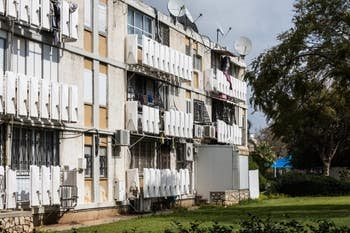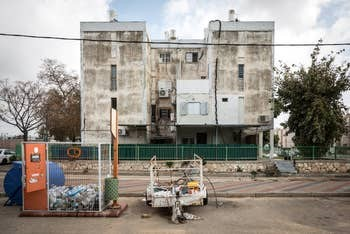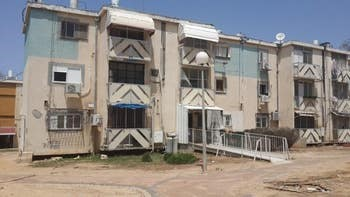The Marker, Hadar Horesh, 09.10.2020
Before surprisingly resigning from his position as Minister of Housing, Yaakov Litzman began a small revolution in the ministry: as is the case with ministers entering new positions, he began appointing a new CEO. Litzman in his previous position as Minister of Health.
Pines formulated with the Minister, and in collaboration with the Ministry of Finance, the new plans to promote construction , which were partially presented to the public. Behind the scenes, Pines is leading a refresher of the firm's top executives and executives. One of the main appointments is that of Nadav Lachman Lazar (38), who has been appointed director of the large and important district of the Ministry of Housing - the Central District.
Pines and Lazar are veteran professional acquaintances from previous positions, Pines in the Budget Division and RMI, and Lachman Lazar in the Ministry of Housing. Later, Lachman Lazar advanced to management positions in the Ministry of Housing, , Which includes supervision of government senior housing and housing companies - headed by Amidar and Amigur.
What is the big challenge for the Central District?
"It is not true that there are no new land reserves. There are many more reserves that have not been developed, although development requires more investment and creativity."
"The districts in the Ministry of Housing are the executive arm of the ministry, and they are responsible, among other things, for expanding the supply of housing and roof agreements with local authorities, designed to fund and coordinate major housing projects . The Central District has large roof agreements in Rosh Hayin, Elad and Ashdod. "Large in Bnei Aish, with 50,000 housing units. In Rehovot, we are involved in a large project of urban renewal in Kiryat Moshe - a neighborhood of Ethiopians, and there is a great social challenge of promoting underprivileged populations."
These are areas with high demand, and on the other hand land reserves appear to be shrinking and rapidly depleting.
"Our job is to locate new land reserves, to see where we can expand further and what models need to operate. The solutions will be in new construction and integrated solutions of urban renewal. At least in the near term, it is not true to claim that there are no new land reserves. "The development requires more investment and creativity. In Gedera - west of Road 40 - there are many potential land reserves in agricultural areas, but it is still in the stages of examination. There are many areas in Beit Dagan, Kfar Chabad and the Sharon area that have not yet been exhausted."
If you go for the farmland and the green lungs, there is indeed an infinity of land. Do we want it?
"The option is in the open and agricultural areas. The ecological question and the issue of conversion of agricultural land is already a question related to the master plan, which determines which areas can be built. I am talking about areas with development potential, where the district is far from realizing its potential. A variety of needs - such as the development of the periphery, the development of transportation systems that support localities and the production of affordable housing in areas of demand. "
"Delays will have a heavy price"
"From a national perspective, a variety of needs need to be considered - such as the development of the periphery, the development of transport systems that support localities and the production of affordable housing in areas of demand"
In the meantime, we are only seeing a decline in the supply of apartments and an increase in the price of the market in the long run. Does that worry you?
" It worries me as a citizen of the country , but it's out of my area of concern. It interests me from the angle I want to influence this issue, the advancement of agreements and plans to enable change. Beyond that, macro issues are off my field."
You see umbrella agreements as a major tool for advancing plans, but time and time again we hear from local government heads disappointment and threats to rescind the agreements.
"Roof agreements are an important tool, but they need to be managed. It is not an agreement that you sign and go home and it exists on its own. Therefore, we need to continue working with the local authorities and accompany them, and that is our role as an office."
What will be the impact of dismantling the housing headquarters?
"It is still too early to examine this. The headquarters was important and promoted important moves but its dissolution did not dismantle the cooperation between the ministries involved, and today the mechanisms are being built that will allow this coordinated operation to continue. The question is what happens in the cooperation between the bodies involved. Back to the Ministry of Housing, and that at least ensures cooperation between these two bodies. We work together and in full cooperation with the people of the Ministry of Finance, who are involved in the mission and constitute an important link in this story, and the good partnership with the Ministry of the Interior continues. "
 Public housing in Or Akiva. "The intention is to assimilate the obligation for public housing in tenders" Photo: Eyal Toug
Public housing in Or Akiva. "The intention is to assimilate the obligation for public housing in tenders" Photo: Eyal Toug
Roof agreements are an important tool, but need to be managed. It is not an agreement that you sign and go home and it exists by itself "
And at the higher level, there is the political upheaval that is holding back budgets and plans.
"The professional units continue to work and prepare the ground, so that when the upper echelon is ready, the plans can be implemented quickly. The uncertainty is still great and it is not only related to the political situation, but also to the health and economic situation." "They are not connected to the state budget. Everyone understands that if there are delays in advancing these agreements, we will pay heavy prices for delays in construction and infrastructure development."
Waiting a decade for an apartment
Among other things, in your previous position you were responsible for the public housing stock. The queue for public housing is only getting longer.
"The waiting time of the eligible depends mainly on where the apartment is required and the criteria of the eligible. Recently an attempt has been made to prioritize the waiting, and the average waiting time is still two years. In places where we have stock, the wait can be very short. "In some cases, the wait can reach ten years. I am not responsible for managing the queue, but only for the stock of apartments we have to offer."
But a wait of ten years, or even five, is meaningless. By the time the family receives the apartment the children are already leaving the house.
"The professional units continue to work and prepare the ground, so that when the upper echelon is ready - it will be possible to execute the plans quickly"
"This has been true in the past, but since the recommendations of the Trachtenberg report were implemented - following the social protest in 2011 - things have changed, and those who are entitled to public housing and we can not offer him an apartment receive significant rent assistance, and so his entitlement is realized through government support. In the last two years, we have been operating another device to assist the family in finding an apartment for rent at market prices, through the housing companies Amidar and Amigur. The real challenge is to create a sustainable mechanism that will maintain inventory in public housing. "Recently, the Rami Council made a decision to assimilate public housing in tenders, in a way that any tender for state land will require an allocation for public housing."
There was such a commitment in the price-per-tenant program as well - to allocate 7% of the tenders for public housing. It was not fulfilled.
"It was also in the price-per-tenant program, but was implemented in only a few tenders, and in practice only 200 apartments were allocated to public housing under the program. The new decision is with high commitment and will be anchored in the ministry's work plan. Important with double value: it will increase the stock of public housing, and create a dispersion of public housing in ordinary neighborhoods, instead of the concentrations that were at the time when public housing was allocated apartments in places where the state had apartments, usually in disadvantaged neighborhoods. ".
 Public housing in Or Akiva Photo: Eyal Toag
Public housing in Or Akiva Photo: Eyal Toag
And yet, most of the inventory the state will have to offer in the coming years will be old apartments.
"It should be understood that the implementation of these decisions will take a long time. Several years pass from the moment the planning decision is made to the time when the apartment is available to us. "When we had a ground-level apartment and wanted to sell it, we had to pay the Israel Land Authority a capitalization fee. Now it has been abolished, and we can get the full consideration and use it to buy new apartments.
Some urban renewal entrepreneurs are complaining that public housing flats are a deterrent in the area, making it difficult for projects to progress.
"The waiting time of the eligible depends mainly on where the apartment is required and the criteria of the eligible. The average waiting time is still two years."
"It is true that sometimes the interest of the public housing company is not the same as the interest of the private tenant, but it also works in the other direction. Unlike private tenants, the state has a transparent and visible set of requirements for developers, and this is a factor. We say to developers: 'Give us exactly what you have offered to the private tenants, and our support for the project is guaranteed.' We will never be the refusing tenant. In the past we told developers that if our voice is needed to complete an 80% agreement, then it is guaranteed. 60%, after the developers said it was the required consent rate. "
Your motivation to increase the value for tenants is lower, because sometimes you even prefer small apartments.
"It is true that we have a standard size of apartment determined by the size of the family - ranging from 75 square meters to 95 square meters - but we also have solutions in case the planning requires larger apartments. We settle for a smaller apartment and ask the developer to transfer the difference in cash. Between the apartment we received and the size of the other apartments in the project. Which is suitable for public housing. "
"Amidar is a business company for everything"
Amidar was recently approved to work as an entrepreneur in the field of urban renewal. Does it make sense to you that a huge government company would compete with private companies?
“Government companies are for-profit companies, and in some ways they are business companies for everything. Competition improves government companies and the service they provide to the public, and this is beneficial to both the private market and the public. The company does not operate freely but only in neighborhoods and complexes where public housing is at least 50%. "Amidar's activities also have additional public profit, because 70% of its profits are intended for the fund for subsidizing urban renewal in the periphery and in places where private entrepreneurs should not act."

Amidar's housing Photo: Amidar
"Government companies are for-profit companies, and in some ways are business companies for everything"
The demand for services for the elderly is on the rise. What are your development plans?
"We have 14,000 tenants in senior housing, in 120 houses with about 12,000 apartments, and we are in the process of increasing the inventory by 2,650 apartments, funded by the Jewish Agency. The apartments are being built through Amigur in an amazing location on Derech Hashalom in Tel Aviv, many of which were We are ready to live there. "
This is very expensive land. Wouldn't it be better to sell it and set up a bigger project somewhere else?
"There is no reason to do that. The elderly in the third age should live, like everyone else, in a place that provides them with nearby services - such as a food store, health fund and cultural institutions. These are older but independent people who need good public transportation. New to the old age home. I contacted a tenant who lived in an old house and asked him if he would like to live in a newer house. He immediately replied: 'Depends on where'. "For older people, who depend on good access to the toilets. We recently set up a thinking team that examines the future solutions for the old age home."



